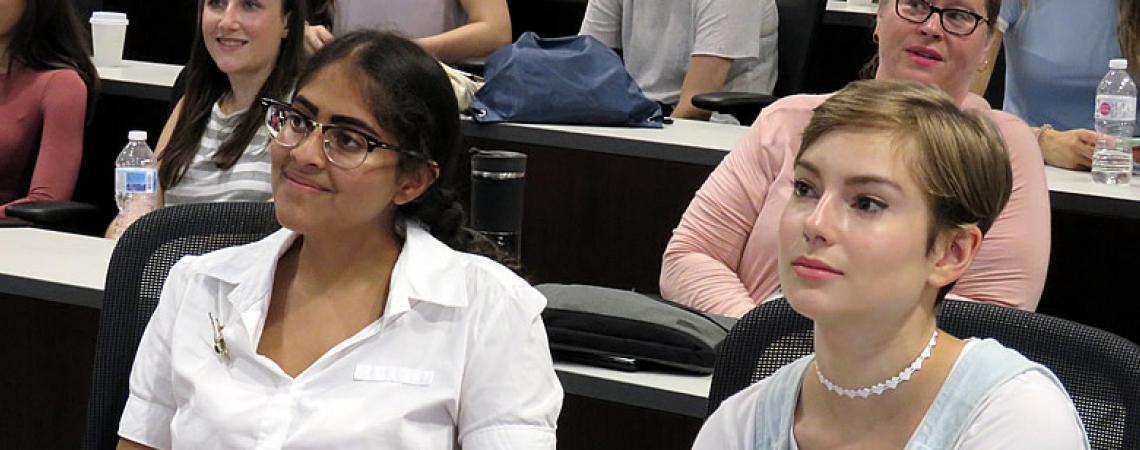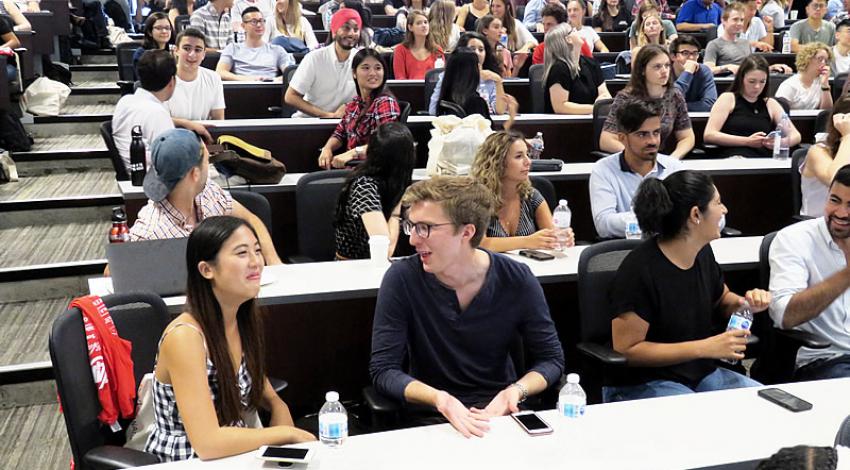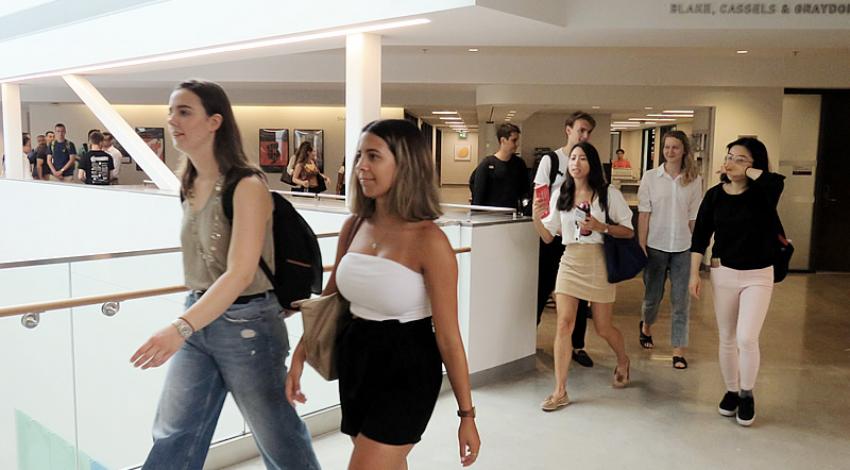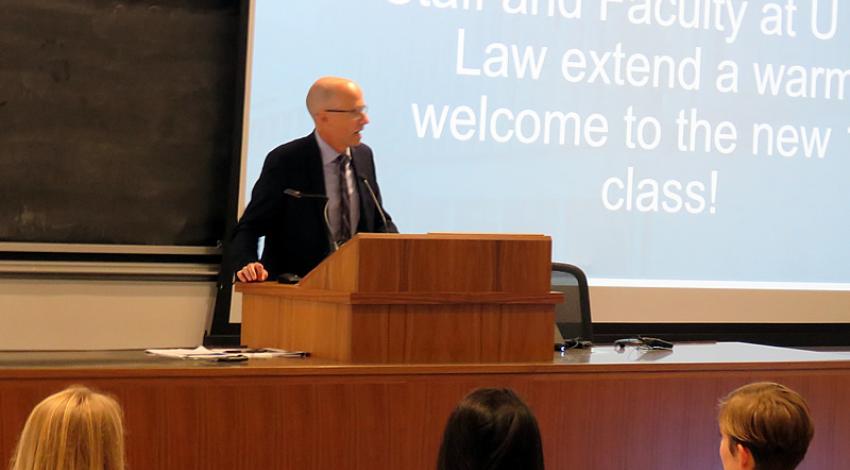1L "boot camp" in law launches students into legal studies
Legal Methods Intensive is now in its sixth year, and students can’t imagine starting law school without it
By Karen Gross / Photos by Jerome Poon-Ting
If you’re old enough to remember the movie and 1980s television series The Paper Chase, or you attended law school at University of Toronto before 2014, you know how terrifying those first year classes might have felt.
“If you weren’t someone who could find either an older student who was willing to spend some time assisting you, or someone in your year who had a very Canadian pre-law background,” says Molly Leonard, JD 2010, “and if you didn’t have someone like that in your circle, there was a certain amount of floundering and hoping you picked it up.”
“It was like The Paper Chase. We used to subject our students to that,” says Ben Alarie, JD 2002, professor and Osler Chair in Business Law. “They used to come in and we’d get right into it.” Which meant diving into the complicated substance of contracts, torts, constitutional or criminal law, often without the advantage of a relevant social science or prelaw background. “Some students came from political science and had a fairly sophisticated understanding of federalism and the constitution,” says Alarie, who has taught contract law and served as associate dean for the first year program. “But others would come with doctorates in mathematics, for example, and had no exposure to anything related to the law.”
For those students – in fact for all first year students – the immersion became a lot less traumatic when Intensive Legal Methods was added to the first year curriculum as part of a review that also included dividing the year into semesters, and adding a legal research and writing course. Now in its sixth year, the two week course, taught in the second half of August, gives all newcomers an introduction to the basics of the law and legal reasoning. The class was the brainchild of Yasmin Dawood, an associate professor of law and political science and Canada Research Chair in Democracy, Constitutionalism and Electoral Law. Dawood had taken a similar course in her first year as a law student at Columbia University. “I found it incredibly helpful,” she says. So helpful, that she began incorporating a version of it into her introductory constitutional law class several years before the official course was launched. “I adapted it so it had a legal methods component for the first several classes.”
Dawood developed the two week course along with colleagues Anthony Niblett and Martha Shaffer, LLB 1987. The three professors put together a comprehensive casebook covering an array of legal areas. They use those cases to teach students basic legal skills, including how to identify the elements of a case, precedent, statutory interpretation and Charter analysis. There’s also a unit introducing Indigenous history and Aboriginal Law, taught by Prof. Douglas Sanderson, JD 2003. The incoming class is divided into three, with Dawood, Niblett and Shaffer each taking a section this coming fall. Dean Edward Iacobucci and Professor Alarie have taught the course as well. Iacobucci says of the course, “I supported the introduction of Legal Methods when it was proposed, and now having taught it three times, am an even more enthusiastic believer in the course’s value in introducing students to the basics before they are expected to absorb doctrine.”
“We also teach students the foundations of the Canadian legal system. So our casebook covers all kinds of useful background information, like how courts work, the specialized vocabulary in law, how courts and legislatures interact,” Dawood says. “We teach them how to prepare for and write a law school exam. And how to brief a case.”
“It would have been enormously useful for me,” says Leonard, who came to Toronto from the USA and is co-founder and partner at Patel Leonard LLP in Brampton, Ontario. “A lot of the curriculum content was really quite foreign to me. Everybody references the Charter and seems to know what they’re talking about. I was like, ‘I’ve read the Wikipedia page.’”
No need for Wikipedia now. And any trepidation faculty may have had about requiring new students to start school in mid- August is long gone.
“I actually loved the course,” says Amanvir Gill, a JD/MBA student heading into second year. “I come from a science background where there’s not a lot of writing. I was a bit scared and nervous. Legal Methods built a really good foundation, instead of jumping right into classes and your first day and you’re asked to read a case and you have no clue what to look for.”
In addition to learning about the law, students get a unique opportunity to learn about each other so the ice is broken by the time classes start. And because first year orientation activities are held concurrently, with pub nights, hikes and other events after class and on weekends, 1Ls don’t feel like they’re entirely missing out on the last bits of summer. “You still get to enjoy yourself, while meeting classmates,” Gill says.
The law school even helps out-of-towners find housing for those extra two weeks, either on-campus in graduate student accommodations or via the listing site PadMapper. “Those were some historical reasons for not implementing Legal Methods sooner,” Alarie says. “The season, the practical issue of finding housing. But now it’s an accepted part of first year. Several different classes have gone through their entire legal education with the benefit of it and they don’t know differently.”
And no one’s complaining. “Our feedback has been excellent,” says Dawood. “I’ve had students tell me they couldn’t imagine starting law school without the Legal Methods course. They can’t imagine what it would have been like before 2014.”
The Faculty of Law, in partnership with the University of Toronto School of Continuing Studies, has produced online modules of this course open to the public for general interest studies, and to students attending or thinking of attending law school. It’s called “Introduction to Legal Principles, Thinking & Reasoning.”
Please note this program does not count towards National Committee on Accreditation (NCA) requirements and is not open to incoming UofT Law students. They will have free access to it after term starts.




